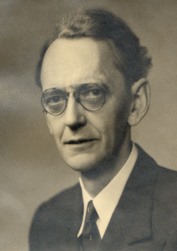Karl Lashley
Karl Spencer Lashley (June 7, 1890 – August 7, 1958) was an American psychologist and behaviorist well-known for his contributions to the study of learning and memory. His work significantly influenced the understanding of the brain and its function in these processes, challenging the prevailing theories of his time.
Early Life and Education[edit | edit source]
Karl Lashley was born in Davis, West Virginia. He pursued his undergraduate degree at the West Virginia University, where he developed an interest in psychology. Lashley continued his education at the University of Pittsburgh, where he began his research in psychology. He earned his Ph.D. from Johns Hopkins University in 1914, where he worked under the guidance of John B. Watson, a pioneer of behaviorism.
Career and Research[edit | edit source]
After completing his doctorate, Lashley held various academic positions, including at the University of Minnesota, the University of Chicago, and finally at Harvard University, where he spent a significant part of his career.
Lashley's research focused on attempting to locate where learning and memory processes occur in the brain. He conducted extensive experiments, primarily on rats, to understand the relationship between brain lesions and their effects on maze learning. One of his most notable experiments involved teaching rats to find their way through a maze, then lesioning different parts of their brains to observe the effects on their memory and learning capabilities.
Through his experiments, Lashley proposed two principles that have had a lasting impact on neuropsychology and the study of the brain: the principles of mass action and equipotentiality. The principle of mass action suggests that the extent of learning and memory impairment is proportional to the amount of brain tissue destroyed, regardless of the location. The principle of equipotentiality suggests that within certain brain areas, any part of that area can perform the function of any other part of that area if it is damaged.
Legacy[edit | edit source]
Karl Lashley's work challenged the phrenology-based view that specific mental functions could be mapped to precise areas of the brain. Although later research, particularly in the field of neuroscience, has shown that certain functions can indeed be localized to specific regions, Lashley's principles of mass action and equipotentiality remain influential. They have contributed to the understanding that the brain is a complex and interconnected organ, where many processes involve multiple regions working in concert.
Lashley was also a mentor to many students who would go on to become influential in the field of psychology, including Donald O. Hebb, who further developed the concept of neural networks and brain plasticity.
Death and Honors[edit | edit source]
Karl Lashley passed away on August 7, 1958. Throughout his career, he received numerous accolades for his contributions to psychology and neuroscience, including the presidency of the American Psychological Association.
See Also[edit | edit source]
This article is a psychology-related stub. You can help WikiMD by expanding it!
Search WikiMD
Ad.Tired of being Overweight? Try W8MD's physician weight loss program.
Semaglutide (Ozempic / Wegovy and Tirzepatide (Mounjaro / Zepbound) available.
Advertise on WikiMD
|
WikiMD's Wellness Encyclopedia |
| Let Food Be Thy Medicine Medicine Thy Food - Hippocrates |
Translate this page: - East Asian
中文,
日本,
한국어,
South Asian
हिन्दी,
தமிழ்,
తెలుగు,
Urdu,
ಕನ್ನಡ,
Southeast Asian
Indonesian,
Vietnamese,
Thai,
မြန်မာဘာသာ,
বাংলা
European
español,
Deutsch,
français,
Greek,
português do Brasil,
polski,
română,
русский,
Nederlands,
norsk,
svenska,
suomi,
Italian
Middle Eastern & African
عربى,
Turkish,
Persian,
Hebrew,
Afrikaans,
isiZulu,
Kiswahili,
Other
Bulgarian,
Hungarian,
Czech,
Swedish,
മലയാളം,
मराठी,
ਪੰਜਾਬੀ,
ગુજરાતી,
Portuguese,
Ukrainian
Medical Disclaimer: WikiMD is not a substitute for professional medical advice. The information on WikiMD is provided as an information resource only, may be incorrect, outdated or misleading, and is not to be used or relied on for any diagnostic or treatment purposes. Please consult your health care provider before making any healthcare decisions or for guidance about a specific medical condition. WikiMD expressly disclaims responsibility, and shall have no liability, for any damages, loss, injury, or liability whatsoever suffered as a result of your reliance on the information contained in this site. By visiting this site you agree to the foregoing terms and conditions, which may from time to time be changed or supplemented by WikiMD. If you do not agree to the foregoing terms and conditions, you should not enter or use this site. See full disclaimer.
Credits:Most images are courtesy of Wikimedia commons, and templates, categories Wikipedia, licensed under CC BY SA or similar.
Contributors: Prab R. Tumpati, MD

